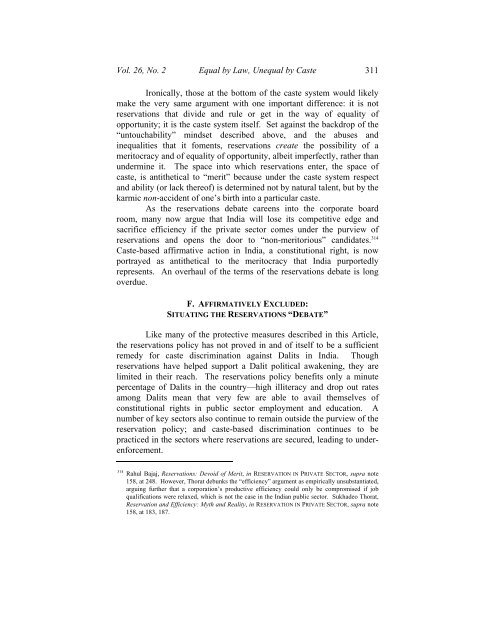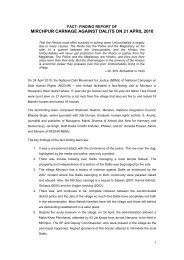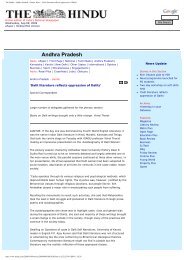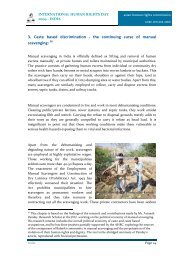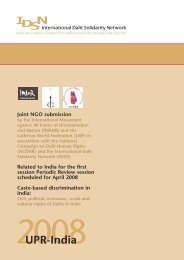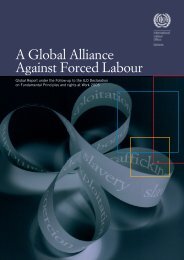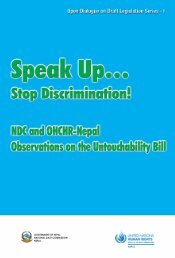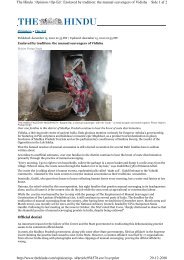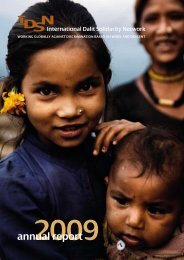equal by law, unequal by caste - International Dalit Solidarity Network
equal by law, unequal by caste - International Dalit Solidarity Network
equal by law, unequal by caste - International Dalit Solidarity Network
You also want an ePaper? Increase the reach of your titles
YUMPU automatically turns print PDFs into web optimized ePapers that Google loves.
Vol. 26, No. 2 Equal <strong>by</strong> Law, Un<strong>equal</strong> <strong>by</strong> Caste 311Ironically, those at the bottom of the <strong>caste</strong> system would likelymake the very same argument with one important difference: it is notreservations that divide and rule or get in the way of <strong>equal</strong>ity ofopportunity; it is the <strong>caste</strong> system itself. Set against the backdrop of the“untouchability” mindset described above, and the abuses andin<strong>equal</strong>ities that it foments, reservations create the possibility of ameritocracy and of <strong>equal</strong>ity of opportunity, albeit imperfectly, rather thanundermine it. The space into which reservations enter, the space of<strong>caste</strong>, is antithetical to “merit” because under the <strong>caste</strong> system respectand ability (or lack thereof) is determined not <strong>by</strong> natural talent, but <strong>by</strong> thekarmic non-accident of one’s birth into a particular <strong>caste</strong>.As the reservations debate careens into the corporate boardroom, many now argue that India will lose its competitive edge andsacrifice efficiency if the private sector comes under the purview ofreservations and opens the door to “non-meritorious” candidates. 314Caste-based affirmative action in India, a constitutional right, is nowportrayed as antithetical to the meritocracy that India purportedlyrepresents. An overhaul of the terms of the reservations debate is longoverdue.F. AFFIRMATIVELY EXCLUDED:SITUATING THE RESERVATIONS “DEBATE”Like many of the protective measures described in this Article,the reservations policy has not proved in and of itself to be a sufficientremedy for <strong>caste</strong> discrimination against <strong>Dalit</strong>s in India. Thoughreservations have helped support a <strong>Dalit</strong> political awakening, they arelimited in their reach. The reservations policy benefits only a minutepercentage of <strong>Dalit</strong>s in the country—high illiteracy and drop out ratesamong <strong>Dalit</strong>s mean that very few are able to avail themselves ofconstitutional rights in public sector employment and education. Anumber of key sectors also continue to remain outside the purview of thereservation policy; and <strong>caste</strong>-based discrimination continues to bepracticed in the sectors where reservations are secured, leading to underenforcement.314 Rahul Bajaj, Reservations: Devoid of Merit, in RESERVATION IN PRIVATE SECTOR, supra note158, at 248. However, Thorat debunks the “efficiency” argument as empirically unsubstantiated,arguing further that a corporation’s productive efficiency could only be compromised if jobqualifications were relaxed, which is not the case in the Indian public sector. Sukhadeo Thorat,Reservation and Efficiency: Myth and Reality, in RESERVATION IN PRIVATE SECTOR, supra note158, at 183, 187.


